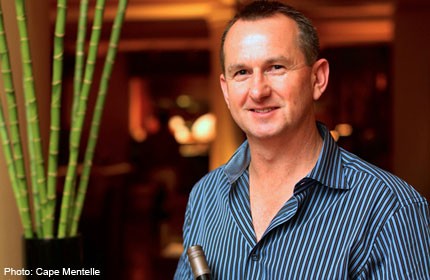Life on the grapevines

Fact: No matter how skilled the winemaker is, a good wine can never be made from bad grapes.
That is where the vineyard's viticulturist comes in. He or she is the person who tends to vines and the soil, from skilful pruning to making sure the soil is healthy and well aerated so that grapevines can produce the best quality grapes.
Indeed, good quality grapes are the key to any successful wine, says viticulturist Ashley Wood of Australian winery Cape Mentelle, in the Margaret River wine region in Western Australia.
The winery is one of the famed region's leading wineries and is known for producing premium and award-winning wines.
The 46-year-old says: "Fruit quality is driven from the vineyards and the winemaking process helps to capture the best expression of the fruit."
He and his team of 10 to 12, which includes an assistant viticulturist and a vineyard manager, tend to Cape Mentelle's 150ha of vineyards.
Varietals grown at the various estates include white grape varietals such as semillon, sauvignon blanc and chardonnay, and red ones such as cabernet sauvignon, cabernet franc, shiraz and merlot.
Mr Wood and his team practise cane pruning, a skilled and specialised method that roughly involves trimming the vine to leave one or two canes or young shoots.
The process, which is carried out during the Australian winter months from June to August, is the main focus of his job.
It helps to control and regulate the yields of each vine, alleviate the threat of diseases and keep canopies open and big. This results in fruit that is more concentrated.
For instance, the estate's cabernet sauvignon vines, which are 45 years old, are pruned so that they produce about 6 tonnes of grapes for every hectare, which Mr Wood says, is considered fairly low-yielding. Average yield can hover at about 8 or more tonnes for every hectare.
The viticulturist was in town recently to launch the winery's 2010 Cabernet Sauvignon.
The ruby red wine has notes of redcurrants, boysenberry, coffee and rolled tobacco with a touch of violets and lavender on the nose.
On the palate, it is a combination of dark berries, couverture chocolate and wet slate with velvety tannins that lead to a long and mineral finish.
The winery's Cabernet Sauvignon releases are often regarded as one of Australia's leading wines in that varietal category.
It is priced at $120 a bottle, and is available at Cold Storage supermarkets and selected wine shops.
Prices for other wine varieties which include chardonnay, shiraz and a sauvignon blanc semillon, start at about $40 a bottle and upwards.
While Mr Wood cannot influence the grapevine directly to produce grapes with certain flavour profiles, what he can do is to make the soil and its surroundings as healthy as possible, he says.
Margaret River, known for its laterite soils that are rich in iron and aluminium, create chalky tannins in the fruit and also have properties that help to retain water which allows vines to grow well.
To keep the soil healthy, Cape Mentelle follows sustainable and organic practices at the viticulture level.
This means that the farming practices have minimum impact on the environment, and the estate does not use herbicides to control weeds.
Instead, the estate rear sheep in the vineyards during the winter, as well as plant cover crops of clover, rye and vetch between the vine rows.
The grazing sheep help deal with unwanted weeds and the manure helps to fertilise plants, while the cover crops produce natural nitrogen for the vines, as well as serve to aerate and provide nutrients for microbes in the soil.
Moreover, the crops, which flower in spring, provide an environment for insects which prevent other pesky ones from entering the vineyard and attacking the vines.
The annual crops also provide a layer of mulch which promotes soil health.
Mr Wood says: "At Cape Mentelle, we are big on using the biology of fauna in the vineyard to protect the vines and the fruit."
He and the team, as well as the winemaker, decide when to harvest the grapes, generally carried out from February to April.
They walk the vineyards every week and taste the fruit on the vine, as well as measure the sugar, acidity and pH levels of the grape juice, before deciding when to harvest.
Mr Wood entered the wine industry in 1994. He has a degree in viticulture from Charles Sturt University in Wagga Wagga, New South Wales, and joined Cape Mentelle in 2007 after working at other vineyards in Margaret River.
The son of a bank manager father, who then went on to run a grocery-cum-news agency business in Swan Valley, had spent his high school years staring at vineyards from his classroom window.
The best part of his job, he says, is literally, seeing the fruits of his labour.
He says: "To be able to take the soil, the sunshine and everything that nature has given to us and craft that into a product that can be enjoyed, is such a privilege."
rltan@sph.com.sg

Get a copy of The Straits Times or go to straitstimes.com for more stories.